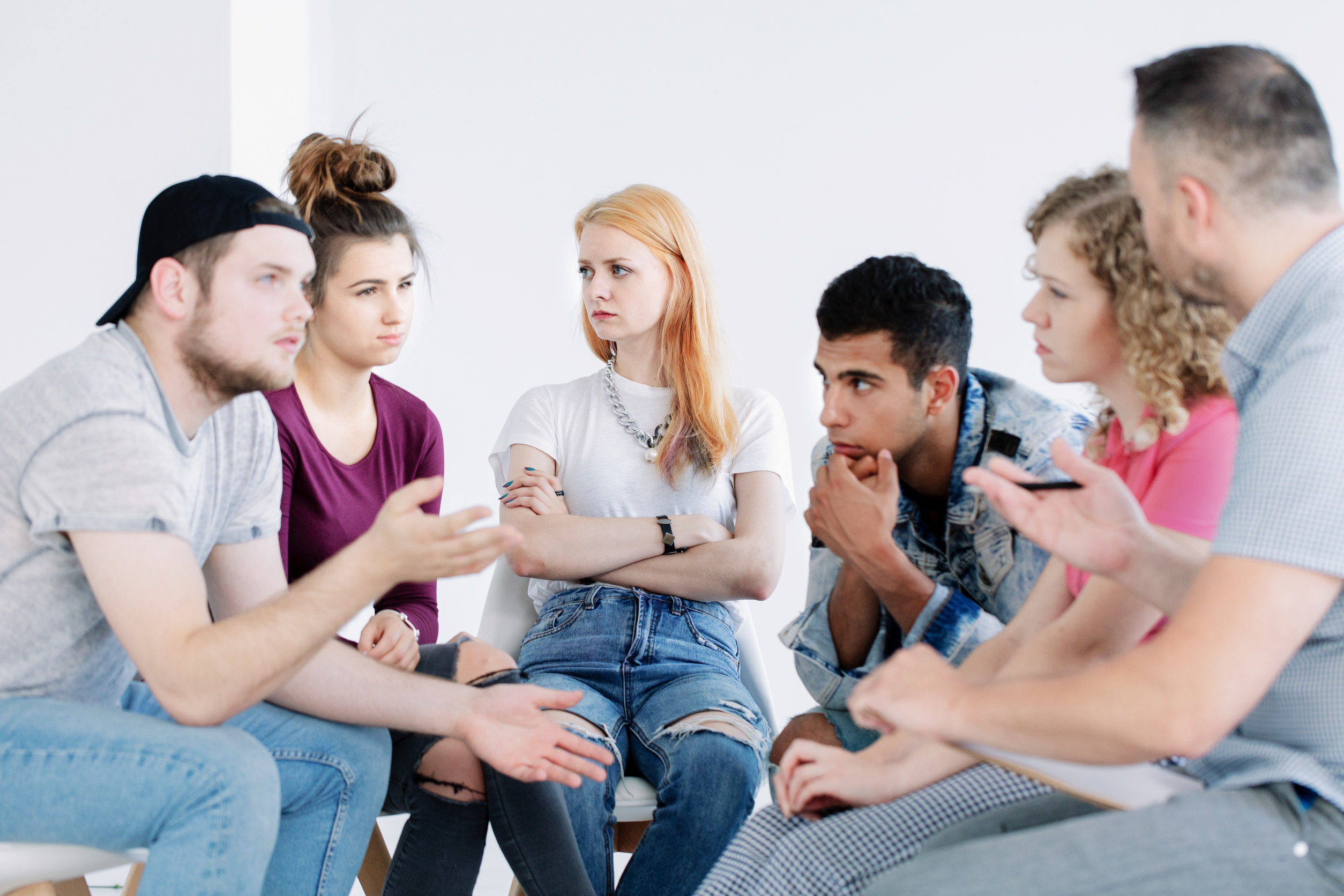| [music] Hi, everyone, and welcome to Recovery Out Loud. On behalf of Niznik Behavioral Health, I’m your host, Noelle Carmen. Today, we are discussing the nature of eating disorders and the positive things we can do as a society, that we can do as clinicians, that we can do as family members to create a positive relationship with food for our children, and start to send different messaging across the boards. With us today is Sara Cantu. She is the clinical director for Eating Disorder Solutions in Dallas, Texas. Hi, Sara. Welcome to the show. |
| Hi, Noelle. Thanks for having me. |
| I so appreciate your time. So let’s just jump right into talking about the factors that play a role in the development of an eating disorder and what that looks like, especially from your view as a clinician. |
| Noelle, parents often ask me that. They’re trying to figure out what they can do, where they went wrong, and I tell them there are so many factors that contribute to an eating disorder. It can include genetic factors, social factors like your peers, who you’re spending time with, the things that you’re exposed to on TV, your environment around you in different situations. So I describe it to parents as the perfect storm. It’s a combination of all the right things coming together in just the wrong way. And it doesn’t always affect the same people, or it doesn’t affect people all the same way. That you might have two kids in the same home experiencing the same family growing up, and they experience that family differently, and their reaction is different. And so one child might have an eating disorder, and the other child might not. |
| You bring up something that’s really interesting, this idea of shame, especially with regards to the caretakers, the parents, in terms of, “What I did.” And that seems like a very natural response as a parent, because you’re the one responsible for this child. And, oh, my gosh, now we’re facing an eating disorder. How is it that you address the emotional side of this? I would imagine that that, too, is part of treating the whole family. |
| Oh, absolutely. So I look at eating disorders as both a genetic concern, but a social concern. And so the answer will be a social answer. Families are absolutely an important part. And when I say family, I’m considering the families that you’re born into, as well as the families that you create for yourself. So it’s definitely an important part of how people work through an eating disorder. Something that you might do to support someone you love with an eating disorder is creating the opportunity for them to try new foods, making food available, not limiting food in any way, talking about yourself, and the other person in a positive way, rather than using praise, which has to do with accomplishment and sometimes a physical appearance. You instead provide encouragement and supporting effort, hard work, their attempt, inner qualities, rather than the outward qualities. We do all we can all do to support each other and be kind to each other. |
| So this is obviously a very complex topic. no easy one, right answer. I’m curious about you and how you got to be involved in this field and the things about it that intrigue you as a clinician. |
| So when I started working with people with eating disorders, I was working just with kids. I really enjoy being a counselor for kids. And I took a job where part of the job requirement was to work with a certain percentage of kids with eating disorders. And at first, I thought, “Oh, no. I don’t think I can do this. This is scary. What if I do something wrong?” But something that I really love when working with families and kids and now adults and teenagers and young adults with eating disorders, is that it is complex. It is complicated. There are many different ways that you can support someone with an eating disorder. So there’s lots of opportunity to help. And that when someone does benefit and work through an eating disorder, it’s so amazing. It’s such an amazing thing to be a part of. |
| I can imagine that kind of experience working with somebody, working with a client, seeing them in the darkest places, and then watching them as they grow into the person that they were meant to be. Can you talk about that in terms of your own experience with clients? |
| Sure. I kind of think of them almost like love letters. Occasionally, I’ll get a card or a thank you email from a parent or a client, and I really hold those dear to me. Some of them come years later. I can remember a time where I think there was maybe a five- or seven-year gap, and I’d worked with the family probably in some of their most difficult days. And five or seven years later, mom sent me an email, and she said, “This day is marked on my calendar. It’s the day we met, and I just wanted to give you an update. And how amazing things are going.” And she told me, “Here are the things that are happening with our family that never could have happened if we had not gone through treatment.” |
| You just gave me goosebumps. Seriously, just gave me goosebumps. It’s incredible. When we’re talking about eating disorders, I was hoping that you could clarify for us because there are so many different phrases out there. Disordered eating. We talk about our relationship with food. We talk about actual eating disorders. We talk about diets. We talk about calories. We talk about– leaning towards talking about things that are healthy, versus punishment with food. So can you sort– I know that’s probably a very broad question, but can you sort through some of these things for us? |
| I do talk to families, clients, other groups of people like teachers about, what is disordered eating? And what is an eating disorder? And I start out and I always tell people that, really, all of us have some disordered eating. We all do things with food, and we think about food or our body in a way that isn’t just concerned with taking care of our nutritional needs. Thanksgiving: we overeat on Thanksgiving, and we know we’re going to do it. So that’s, in a way, disordered eating. So we all are involved in some of those things some of the time. But the difference between someone who’s involved in disordered eating some of the time and someone who has an eating disorder is the level of impact it has on your life. You now have an eating disorder when it’s become disruptive to the things that are important to you in your life. If it’s negatively affecting your body, if it’s negatively affecting your important relationships, if it’s getting in the way of goals that you have that are really important to you, it’s now become an eating disorder. |
| And you sort through some of the notions that we have about the more specific things like bulimia, anorexia, restricted eating. Can you define and shape some of those things for us to get a better picture? |
| It’s a moving target, so it’s not always precise. Again, each one of those things that you just described, bulimia, if there’s or is kind of a line in the sand– if you have done these things this many times or this frequently or you’re having these negative side effects or symptoms, it’s now something that can be defined as an eating disorder. You said restrictive eating; that’s a great example. There are times when we do that. Thanksgiving, again, a perfect example that there are people who will, “Well, we didn’t have breakfast this morning because we know we’re going to be eating Thanksgiving around lunchtime, so we skipped breakfast.” Technically, that’s restrictive eating. Fascinating. At that point, it’s not negatively affecting our bodies and how our bodies function, it’s not negatively affecting our lives or our relationships. So at that point, it’s not an eating disorder. |
| As we look at people around us close to us talking about eating disorders, what about signs? What if I’m a mother, and I’m worried, and I’m thinking, “Hey, I should be looking for this or I should be looking for that.” Can you talk us through, as a parent, what are we looking for and what could we possibly be missing? |
| Sure. That being a parent, a caregiver, a teacher, anyone involved with kids, let’s say people, because people have eating disorders is such a challenge because you cannot expect yourself to catch every red flag. It’s impossible. So putting that pressure on yourself is really unreasonable. But the things that you might look for are changes and routine, changes in things that people will or won’t eat, changes around food situations. So an example of that might be maybe previously this person loved to go out to a restaurant sometimes. And now they’re saying, well, they don’t like that restaurant, or they say something about the restaurant situation is uncomfortable for them, that you might notice those things. That doesn’t necessarily mean that they have an eating disorder, but it indicates that there’s concern there or distress there, that a loved one could certainly address with the person. |
| So what if I’m a parent and I suspect my child might be struggling in this way, is it appropriate to have the conversation? And if there is an issue, could that exacerbate the situation? Should a parent seek professional help first or have the conversation or– what would a parent do? Because I could see, being a parent myself, walking on eggshells, like, “I don’t want to make this worse, but I also don’t want to ignore this.” |
| Right. Now that is a really tricky question because each situation is so different. I think I would recommend that any parent any concern, change in behavior, change in mood or attitude would address those things with their child focusing on what they saw. So not necessarily labeling because you don’t know yet if there’s a need for a label. But if you notice your child who typically loved to come home after school and have a snack and after snack, kind of get down to work with their homework and they don’t want to snack anymore, rather than saying, “Is this an eating disorder? Do you have disordered eating? Are you restricting your food?” you might say, “I notice that you always wanted a snack before. And now you don’t feel like having a snack. I wonder what’s different.” |
| Can you talk to us a little bit about myths that exist around eating disorders? I know there are– I know there are a lot of them. |
| Right. I mean, we maybe need a whole nother interview for all the myths out there. I think this is an important topic. I think in the eating disorder profession even, we have learned more, improved what we do. We’ve gotten better. And along with that, so has our culture and society hopefully learned more and understood more. There have certainly been so many confusing messages about what is an eating disorder and what does someone who has an eating disorder look like. And the answer is they look like everybody else. People with eating disorders can be a person of any age, gender, or non-identifying as a gender or a culture or ethical background– ethnical background, sorry. It can be anyone. It can be a person in any size, shape body. And I think that because there are those myths that a person with an eating disorder looks one way or acts one way, we miss the opportunity to support all of the people who have eating disorders that don’t necessarily fit into those categories. |
| You mentioned the word support, and I want to go back to that because I know just from having spoken with you earlier how important it is to approach this in a very positive way. And it’s easy to slide into a negative slant in terms of seeing food as punishment or seeing these things in a very negative way or tantamount blame and shame and those kind of things. So moving it into a very positive way, what are the positive things we in our homes can do to support a healthy relationship with food and to support positive eating behaviors? |
| I think it’s important, again, at any age. There are certainly kids of different ages who are more impressionable. But at any age to love your own body. Let other people see that you love your body. And acknowledge that people come in all shapes and sizes and that our bodies are amazing. Well, okay, go ahead. |
| Okay, well, okay, so you’re bringing up more questions for me. So I would ask more specifically, what if you don’t love your body, how do you start to love your body? What does that process look like because so many of us really do not love our bodies? And I understand it’s so important, but how do you make that jump? |
| It is hard. It’s hard. It’s a hard thing to really believe deep down. And it’s something that we think about in eating disorder treatment that if there is someone who really is dissatisfied with their body, hates their body to expect that in the course of treatment, they’re going to move from that to loving their body is probably unreasonable. But to appreciate their body, acknowledge the things that their body does for them, that their body has shown up for them every day and works hard for them is maybe the next step. So we can do that for ourselves that we acknowledge, “I woke up this morning, my body can do the things it needs to do for me, my body works for me every day.” are the beginning steps of acceptance and acknowledging how resilient our bodies are. |
| So another tough question for you. What about the medical community? What can the medical community, because they see everybody– I mean, surely they’re seeing a lot more eating disorders than perhaps they realize. What can they do in a very positive sense to begin to identify these things, to begin to help families with these issues? |
| I think the most important step that any provider can take is to start to break down those myths for themselves or their patients and the people that work in their office, that they’re not just looking for one type of person. All types of people have eating disorders or are affected by negative body image, negative thoughts about food. And so some specific things that providers do– and sometimes I ask clients to and practice with them conversations that they might have with their providers to help their providers know what they can do that would be more supportive. So I sometimes talk to clients or patients about meeting with their doctors, calling their doctor’s office ahead of time and saying, “I don’t do weights, or I’d prefer lined weights, or this is an issue for me and please be sensitive to it.” So to prepare their providers a little bit ahead of time because it is so hard, I think even going to a doctor’s appointment can sometimes feel very vulnerable. And it’s very hard in the moment to let someone know, “This is what I need from you.” |
| What if someone seeing this now and going, “Oh my gosh, I need to get on this, I need to make sure I’m actually doing really healthy things for my family.”? What are the first steps someone should take right out of this conversation, start to look at in terms of changing behaviors and changing attitudes or not even changing, just making sure they’re in the right place? |
| That’s a tough question. I would say you could start by making food situations, not just the food and not just what’s on your plate, but the situation around food, a warm, welcoming, inviting situation, a social situation. So in a home or with a family, that might mean that you do talk about food in a positive way rather than a negative way. So rather than talking about what negative impact the food might have on your body, you talk about that it tastes great or that it looks really good. “Oh, that looks great. I can’t wait.” Or creating a meal situation that is positive and inviting and social. So holding a nice conversation while you have a meal. |
| So it sounds like taking just an entirely positive attitude and creating that in your household would be an amazing step towards health and health around food. And I can totally see where that would be a wonderful thing to do for your family. There’s something I want to reiterate before we close our conversation. I want to get back to our stereotypical idea of, at least in the past, what we thought an eating disorder looks like, because I felt like that is such an important point. I really wanted to come back to it and let you speak on it again because you actually emphasized it in terms of what we think an eating disorder looks like isn’t necessarily the one way that things go. So can you just talk us through that again and make sure that we actually really emphasize that idea? |
| Sure. There’s not a way to look at someone and know that they have an eating disorder. And I think when we do that, we negate somebody else’s experience, we miss providing them support or feedback on what they’re doing. So people with eating disorders look and behave differently. They don’t all look and behave the same way. They come in different bodies. They are all ages. There are many different reasons why someone might begin an eating disorder. And even within an eating disorder, someone’s thinking and behavior can be very different. And there’ll be an eating disorder there. |
| I want to ask you for a message of hope. What if somebody is watching this and they really are in that deep, dark place and I can only imagine the hopelessness that might come with experiencing an eating disorder, what would your message of hope be? |
| In all the time that. all the years I have worked with people with eating disorders and all the clients that I’ve seen with eating disorders, people with eating disorders are amazingly resilient, determined, strong, capable people. And while in the midst of their eating disorder, they can’t believe that message. It’s true. And that means that they have the ability, the resources within themselves to make a change and to help themselves. |
| I love that. I want to thank you, Sara Cantu, for taking time out of your day to have a conversation. Thank you for your expertise. Thanks to our viewers for joining recovery out loud. Have a great day, everyone. |
Eating Disorders and What Triggers Them
Featured Guest: Dr. Sara Cantu, PhD LPC-S LMFT RPT-S CED-S CIMI

Co-occurring substance abuse and eating disorders are a common challenge faced during the recovery process. Just as it is necessary get to the root causes of addiction, understanding disordered eating at its core is also vital to successful recovery. This week we spoke with Dr. Sara Cantu of Eating Disorders Solutions about what eating disorders are, what triggers them in some people, and how to find help.





